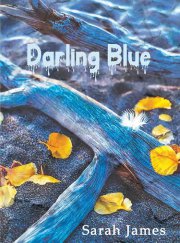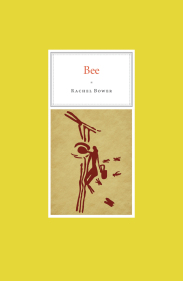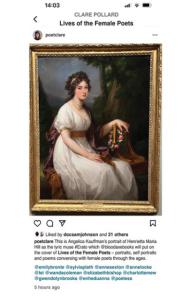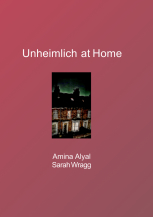
2018
JUNE CONTRIBUTORS
Faiza Anum, Carl Boon, Mark Blayney, Lorraine Carey, Louis Gallo, M. J. Iuppa,
Karen Poppy, Jane Salmons, Claudia Serea, Bruce Taylor, Terry Tierney.
FAIZA ANUM
The Coronation of a Crow
I will dive into my own mirror
Deliberately dipping my dark and dry feet
In the canvas of the Canal
Once, then again, and again.
The nails on my feet have a finer dip
Than a fountain pen
With which I will toddle a novel tale:
That I will never sink like the trees and the twigs
Trembling on seeing their own shabby faces
In the water.
So, I love both my first and second selves
And I crown
Myself the king of mirrors.
Faiza Anum is an educationist, poet, researcher and occasional translator. Currently, she works as a lecturer at the department of English, the University of Lahore, Lahore, Pakistan. Her poems have appeared in Transnational Literature (Australia), Illumen (Alban Lake Publishing, USA), Yellow Chair Review, and Open Road Review (India). Her poem “Travelling Tales” was one of the finalists for Open Road Review Poetry Prize 2015.
Back to POETRY ARCHIVE
MARK BLAYNEY
Properties of Koans
At night in the jade museum
the figurines do not come alive and dance
being too proud and serious for that.
Too serious, also, to live. Living
is for those blessed with less intelligence.
Instead, they rest content with immortality.
We hide smiles as you turn the key
and steal inside. Ascending the creaking steps
each floor, mountain-like, is cooler than the last.
Our guide, affronted by our frivolity
asserts quietly it proves the old text right.
You think, she says, turning in the green
exit glow, that immortals live? They do not.
Life is too tiresome. Knees click
as we reach the fifth floor. Instead they know,
she adds, strip lights flicking on
like lightning, that immortality
is to be enjoyed from a better vantage point.
She takes a guide page from the rack, uses it
as a fan. Look, she says, and we look.
A smoke-black bear. Tigers, roused.
A monkey takes a peach. I once
drank that juice, our guide murmurs
and her eyes on ours are the palest blue.
The jade is from the Qing dynasty,
its colleagues joining imperceptibly
from the lower Song, centuries before.
As if trying to help us understand, there’s a
leaf, veins etched, with two small holes,
nibbled from the hard stone by weevils.
Tomorrow the police do a routine check
but nothing is stolen. Just a break-in. The man
on the desk is serene. That’s fine, he breathes
as two dragons climb a vase to form its handle.
Tethered by bamboo they watch the officers leave,
eyes alert, mouths mournful.
Mark Blayney won the Somerset Maugham Award for Two kinds of silence. His third story collection Doppelgangers and poetry Loud music makes you drive faster are published by Parthian. Mark has been longlisted for the National Poetry Competition and is a Hay Festival Writer at Work. www.markblayney.weebly.com @markblayney
Back to POETRY ARCHIVE
CARL BOON
Terrible Edirne
In all the mosques, Nilay saw faces
she thought she had forgotten:
her grandmother’s at Selimiye
saying beware of certain novels
that will haunt you till you shrink.
A high school friend inside Muradiye
said don’t go in the dark—it’s ripe
with men who will measure your feet
and throw figures to the wind.
In the Eski Mosque off Emin Ertan
I twirled clover in my fingers,
desiring candlelight, a place to sit.
One grows weary of being looked at
again and again and forever.
Bring me down, I said, as she loafed
like Whitman past the bakery,
not looking back. The beautiful
who’ve forgotten us never look back.
Carl Boon lives in Izmir, Turkey, where he teaches courses in American culture and literature at 9 Eylül University. His poems have appeared in many magazines, including Posit, The Maine Review, and Diagram. A Pushcart Prize nominee, Boon recently edited a volume on the sublime in American cultural studies.
Back to POETRY ARCHIVE
LORRAINE CAREY
Alice and her Stilettoes
We always walked faster
past her little house on the brae.
Every so often she'd scuttle out
And snare us, clutching a plastic bag
with the highest heels, scuffed
and peeling, ready for the cobbler's vice.
Her elfin face powdered,
her fuchsia mouth pursed,
the stain snaked onto her snaggled teeth,
crept over her lips.
She lay in wait,
behind net curtains that twitched.
Her ears hitched to the sound
of the school bus, stalling,
as we stepped off at Charlie Brown's,
stinking of fags.
Once John got three pairs
of spine benders, for repair,
so she had a choice,
for Mass on Sunday.
Lorraine Carey's poetry has featured in: Atrium, Prole, Picaroon, Sixteen, Poethead, Laldy and Ariel Chart among others. Her debut collection From Doll House Windows - Revival Press was published in June 2017. She was a runner up in both the Trocaire / Poetry Ireland and The Blue Nib Chapbook Competition 2017. “Alice and her Stilettoes” Previously published on Poethead, 23 March 2017.
Back to POETRY ARCHIVE
LOUIS GALLO
Apple Blossom Time
My mother and father sit at the kitchen table
a few years after World War II., the table with aluminum legs
and cracked porcelain top. My mother spreads a clean cloth
of starched white linen. She frets over a smudge in the fabric.
My father talks about the war. He opens a pack of Target tobacco
as my mother spreads a starched white linen tablecloth.
My father does not notice the grease spot. He talks
about the war. A dull light bulb, coated with grime and dust,
hangs from the ceiling. My father has not had time to change it,
to make it brighter. He talks about the war.
My mother worries about the smudge, has tried everything.
Lemon juice won’t touch it, nor Oxydol.
My father curses the interminable waiting in lines
during the war, Indian toilets – he was stationed in Karachi –,
an explosion that blinded two men. My mother spreads the tablecloth.
She listens to “Apple Blossom Time” on a small Bakelite radio
and hums along. My father sprinkles Target onto cigarette paper.
My mother fears a burning ash might scorch the linen.
She cuts her finger on a chopping board. Her blood seeps into the onions.
My father blows a blue smoke ring and thumps the table.
My mother feels the sting of lemon in her cut.
My father says that war saved the economy.
My mother wraps a bandage around her finger and slices
a pecan pie she has just removed from the oven. She hopes
no one will notice the grease spot. My father smokes and talks
about the war. The Andrews Sisters swirl in my mother’s head.
The murky kitchen light makes smudges hard to see. My mother never asks
my father to replace the bulb. My father has doubts about Eisenhower.
My mother says we’re out of Ajax. Tomorrow is grocery day,
and she compiles a list. My father says we had to bomb Japan.
I am somewhere in the house, so is my baby sister.
My sister will not remember our father talking about the war
or mother fretting over a tablecloth. Or the kitchen table.
The war, my father says, made us older. My mother is not old.
Nor is my father. Hitler got the economy rolling, my father laughs.
My mother and father sit in the kitchen. A small Bakelite radio plays
the Andrews Sisters. My mother thinks grease from the bulb dripped
onto the tablecloth. She has tried everything. My father rolls
a cigarette. He licks the edge and folds the paper into a cylinder.
He strikes a Diamond match with his fingernail, a trick he learned in India.
My mother tells him that we’re out of Ajax. My father talks about the war.
I am somewhere in the house, but where? Where is my sister?
My mother’s grocery list is long. My father says don’t forget the Target.
He says war ended the Depression, not FDR. My mother coughs
when the cigarette smoke gets too thick. My sister and I must be playing
in another room. Sometimes we run into the kitchen and see our parents
sitting at a kitchen table with aluminum legs. A white cupboard.
The orange pack of Target tobacco. A smudge on the starched
white linen tablecloth. Our mother rubbing it with lemon juice.
The bandage on her finger, the wedding ring. A dull, smoky yellow light.
We’re out of Ajax. The room is dim. Stinking holes in India.
The war has ended. Our father’s back, Hitler dead. The economy
looks good. We’re going out to buy a new car, a Plymouth V-8,
my father says. My sister is too young to remember.
I sway close enough to that edge of oblivion myself, where whorls
of darkness break forth as glowing suds of light and shadows ignite
the forms that galvanize our lives.
Our mother and father sit at the kitchen table.
I started a joke
I wrote a letter to Barry Gibb
offering to take the place
of Robin and Maurice
(may they RIP)
though I can’t sing
because I can’t stand
to see things end
and I love Robin’s
falsetto tremolo
and true you guys
went bad with that
disco caca
but so what?
Everybody writes
a bad poem
every now and then
(like this one),
even Keats . . .
but mostly I hate
things ending
like the Bee Gees
& eventually
the human species,
even the universe . . .
man, I hate that
Louis Gallo’s work has appeared or will shortly appear in Southern Literary Review, Fiction Fix, Glimmer Train, Hollins Critic,, Rattle, Southern Quarterly, Litro, New Orleans Review, Xavier Review, Glass: A Journal of Poetry, Missouri Review, Mississippi Review, Texas Review, Baltimore Review, Pennsylvania Literary Journal, The Ledge, storySouth, Houston Literary Review, Tampa Review, Raving Dove, The Journal (Ohio), Greensboro Review,and many others. Chapbooks include The Truth Change, The Abomination of Fascination, Status Updates and The Ten Most Important Questions. He is the founding editor of the now defunct journals, The Barataria Review and Books: A New Orleans Review. He teaches at Radford University in Radford, Virginia.
Back to POETRY ARCHIVE
M.J. IUPPA
Spring’s Riddle
It’s not a question of weather, the sun
flattens in its patience, waiting for
its cue to shine. What will tease us
into believing that the twitching
light isn’t rain mixed with snow?
Beneath the sycamore, crocuses
with mouths full of ice begin
to sing their resistance.
The first redwing arrives, then
another rings the lilacs.
The lake sky unlocks—ready.
I keep my eyes open and focus
on nothing.
Icarus Girl
The pageantry of morning’s fresh snow
trims every rail and limb and acute angle
awakening that unmistakable tingle of
happiness that quivers like a shock to
the green-eyed woman’s face, whose
mouth rarely parts with a kind word or two
except on a morning such as this, when
a girl with chestnut curls falls from the lake
sky and sails, arms outstretched, over cresting
waves and light glistening near the edge of
the pencilled horizon, sailing beyond
hues of dawn, dragging her big toe
to stir a wide wake
without making a splash.
M.J. Iuppa ‘s fourth poetry collection is This Thirst (Kelsay Books, 2017). For the past 29 years she has lived on a small farm near the shores of Lake Ontario. Check out her blog: mjiuppa.blogspot.com for her musings on writing, sustainability & life’s stew.
Back to POETRY ARCHIVE
KAREN POPPY
At Nezu Shrine
Tokyo, Japan
While there is something
to be said for stillness,
I would rather be
water moving than stone
smoothed by it.
I would rather be light
falling than a mountain
shadowed by loss of sun.
I would rather be
leaves moving toward
light, haphazard,
without eyes, but
with the sense,
always, of moving
toward you, just as you
move toward me.
While there is something
to be said for stillness,
movement also has its natural course.
Like a great black bird,
perched here on
this red painted gate,
ready to take flight,
wings spread against sky,
trees soon beneath it.
Karen Poppy has work published or forthcoming in The Gay & Lesbian Review Worldwide, ArLiJo, Wallace Stevens Journal, Parody Poetry Journal, and Voices de la Luna, among others. She has recently written her first novel, and is an attorney licensed in California and Texas. She lives in the San Francisco Bay Area.
Back to POETRY ARCHIVE
JANE SALMONS
After Dad Died
as if weeping were a seed
and I the earth’s only furrow
Pablo Neruda’s “Lightless Suburb”
So dark
in the coalbunker
between cobwebs.
A vacuum packed
silence. Trapped
sciatic nerve. A mouth
full of soot and ash.
Starlings line up
on a telegraph wire
against winter sky.
Why do you whistle
that tune in my dreams?
Wading through a field of mud
arms outstretched
at the foot of the stairs.
Let’s play a game of Scrabble
without vowels. Crypt. Rhythm.
Hymn. Cwtch.
In the Dead of the Night
A wolf steals through my house in the dead of the night
his breath mists the windows, his scent marks the mat
nothing remains when the day becomes light.
He sidles and slavers, he’s wiry and slight
he zigzags and backtracks, this way and that
a wolf steals through my house in the dead of the night.
He howls at the moon, his teeth gleaming white
he prowls in the pantry, he scavenges scraps
nothing remains when the day becomes light.
I’m jittery, I’m skittish, my nerves are wound tight
he growls from the shadows, he snarls and he snaps
a wolf steals through my mind in the dead of the night.
He sneaks up the stairwell, it’s only one flight
a blur of grey fur, his yellow eyes flash
nothing remains when the day becomes light.
He lolls on the landing and gives me a fright
he grins and he preens in my dark habitat.
A wolf steals through my heart in the dead of the night
nothing remains when the day becomes light.
Jane Salmons is a teacher living and working in Stourbridge in the West Midlands, UK. She is currently studying an MA in Creative Writing and has been previously published in Ink, Sweat and Tears, Algebra of Owls, Snakeskin, I am not a Silent Poet and Creative Writing Ink. In addition to writing poetry, in her spare time she enjoys creating handmade photomontage art.
Back to POETRY ARCHIVE
CLAUDIA SEREA
Ode to slow cooking
Nothing good comes quickly,
the old woman said,
chopping the Holy Trinity
for the pan.
Rushing never made a great stew.
You have to let the parsnip fibers break
and the vertebrae sing.
Let the marrow melt
and dissolve, slowly,
the way water carves limestone
into caves.
Add the ox heart tomatoes later,
and feel the sweetness
when you taste for salt.
Think how far, how long
the peppercorns traveled
from Vietnam
and the Malabar Coast
only to open their small eyes
in your pot.
Add bay leaves,
the chef’s Olympian crown.
Pour a swirl of wine
and taste again
the dark nipples of the grapes
in the seaside wind.
History is there,
and love
with a hint of grass
in the lamb bone.
Claudia Serea’s poems and translations have appeared in Field, New Letters, 5 a.m., Meridian, Gravel, Prairie Schooner, and many others. An eight-time Pushcart Prize and four-time Best of the Net nominee, she is the author of Angels & Beasts (Phoenicia Publishing, 2012), A Dirt Road Hangs From the Sky (8th House Publishing, 2013), To Part Is to Die a Little (Cervena Barva Press, 2015) and Nothing Important Happened Today (Broadstone Books, 2016). Serea is a founding editor of National Translation Month, and she co-hosts The Williams Poetry Readings in Rutherford, NJ. Her latest project is Twoxism, a poetry-photography collaboration blog with Maria Haro.
Back to POETRY ARCHIVE
BRUCE TAYLOR
Always Expect A Train
says the new sign at the tracks near my house
I’ve crossed three or four times a day for years
on my way to wherever to get whatever
I need or want or think I have to have
but I’ve never seen one coming or going
nor even, as I’ve imagined, been stuck there
watching car after car rumble by full of whatever
going wherever or rumbling empty back.
I’ve not even seen a speck of one at a distance,
future engine speeding my way or red caboose
at last trailing away, vanishing into the past.
But some nights when the stutter in my heart
wakes me before dawn, or one of my old regrets
sits on the edge of the bed smoking and sighs,
the moan of a not so distant whistle haunts me
and rumbles in the dark I always am expecting.
Tracking in Snow
Most mornings we know
the tracks outside our door,
bunny and Bambi, Rocky
the raccoon we recognize
even without his mask.
Sometimes we can’t and don’t.
Something feline the books say
though we’ve never seen a cat.
Something canine but dogs don’t
run loose this time of year.
Once from our shore somebody
stepped off, walked straight
across the frozen lake
alone, in the dark, in the cold,
at least as far as we can see.
Fresh snow covers everything,
scratch of squirrel or crow,
even our own familiar trails
which took us somewhere and
brought us, this time, back.
Men Fishing with Wives
Who runs the motor who steers the boat,
knows what’s biting on what and where,
who handles the anchor who ships the oars
who’s too quiet or never quiet enough?
Who wears the silly hat who forgot the beer
or the bait or sunscreen or bug spray
who remembers what the other forgets
who is always right at least half the time.
Who wants to catch the big one, who doesn’t
care if they ever catch anything at all.
Over the years they’ve learned things
upon which they’ve learned to agree.
Never let the fish get in the way of fishing.
Never let the holes in your net get bigger
than the fish you hope to catch.
Be patient. Keep your bait in the water.
Bruce Taylor’s poetry has appeared in such places as: Able Muse, The American Poetry Journal, The Chicago Review, Cortland Review, The Formalist, Light, The Nation, The New York Quarterly, The Northwest Review, Poetry, Rattle and on Writer’s Almanac.
Back to POETRY ARCHIVE
TERRY TIERNEY
lances down from red maple,
squirrel darting in retreat, clutching
phone line, ducking for cover.
I sense the airborne threat,
trying to pick cherries, a boy
with courage only for ground fall,
the blue jay's screech and swoop
protecting even rotten fruit.
I fill the bird bath to distract him,
his sharp beak and talons
claim cherries and water, staining
the basin red with skins and pits.
My family moves to a new town,
then another, each house white,
a three-bedroom ranch where
blue jay perches in the backyard tree,
redwood, box elder, catalpa, spruce,
blue jay always the same.
It was years before he found me here,
my own ranch house,
my cherry seedling.
When he lights on my window sill
I know what he will say.
Every move disturbs his nest.
Last house, last tree,
blue jay the color of sky.
Terry Tierney has poems coming or appearing in Valparaiso Poetry Review, Front Porch Review, Third Wednesday, Riggwelter,Rat’s Ass Review, Cold Creek Review and other publications. He has stories coming or appearing in Jersey Devil Press, Fictive Dreams and SPANK the CARP, Longshot Island, Literally Stories and Big Bridge. Website: http://terrytierney.com
Back to POETRY ARCHIVE



